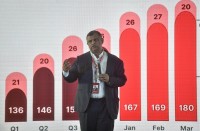
(Reuters) — People on the streets of the Greek capital expressed anger with their government on Wednesday (July 1), the morning after Greece defaulted on a 1.6 billion euro loan from the International Monetary Fund (IMF).
Greece’s last-minute overtures to international creditors for financial aid on Tuesday (June 30) were not enough to save the country from becoming the first developed economy to default on a loan with the IMF.
The IMF confirmed that Greece had not made its scheduled 1.6 billion euro loan repayment to the fund. As a result, IMF Managing Director Christine Lagarde will report to the global lender’s board that Greece is “in arrears,” the official euphemism for default.
Prime Minister Alexis Tsipras was filmed entering his office on the morning of the default.
Speaking to Reuters TV in central Athens, residents were disillusioned with the outcome of the debt crisis with many of them calling for the government to act.
“I want him (Tsipras) to see reason and make a compromise, compromise is a normal act for humans. The society has reached its limits. I’m not saying that all the measures that have been taken are right but I think that a compromise needs to be found because there is a point of no return,” said 49-year-old teacher, Christos Alexakis.
“First and foremost this government must stand down. The last six months, don’t let me tell you what they have done. They don’t know what they are saying or doing. They (the government) have lost their minds. It is better that they go. Secondly, the referendum must not take place. If it takes place the government is going to be ridiculed. Everybody is going to vote yes, yes to the euro, yes to Europe,” said 67-year-old pensioner Dimitris, referring to Sunday’s (July 5) referendum called by the Greek government on austerity measures.
“The government must resign, leave and call elections, or we should have a unity government. I cannot see any other solution. We are bankrupt, we are over. Can you not see what is happening in the banks?,” said 49-year-old office employee, Fotis.
“This is the worst situation that Greece has ever seen, ever. Even during the occupation (WWII), it wasn’t that bad. But this party said “Europe, the euro, it’s not a taboo for us,” said 72-year-old pensioner, Theodoros.
But one man said he felt a no vote in the upcoming referendum would be the best way for the country to go.
“The country went bankrupt in 2010. The government then instead of rising to the occasion, brought in the IMF and we have been living in bankruptcy since 2010. I hope that the Greek people will rise to the occasion and they will vote no and everything will turn out fine,” said retired naval officer Costas.
Fears of a Greek default have unnerved financial markets on concerns that it would ultimately lead to the country’s exit from the euro common currency. The fate of Greece’s membership in the 19-nation currency bloc still hangs in the balance ahead of the referendum on Sunday when Greek citizens will vote on whether to accept the austerity terms of continued international aid.
An opinion poll published on Wednesday in the Efimerida ton Syntatkton newspaper, said 54 percent of Greeks plan to oppose the bailout proposal against 33 percent in favour.
However a breakdown of the results compared with a poll taken before the decision on Sunday (June 28) to close Greek banks showed the gap between the “yes” and “no” votes narrowing slightly.
In a sign that European officials have not given up on finding a solution, finance ministers said they would confer on Wednesday (July 1) over Greece’s latest loan request and debt restructuring.
It was unclear how much the Wednesday call could achieve. Trust between Athens and European capitals is in tatters after five months of acrimonious negotiations, and the relationship further deteriorated after Athens on Saturday (June 27) decided to put creditors’ proposals to a referendum.
Greek Prime Minister Alexis Tsipras has said the plebiscite is the democratic way for Greeks to decide if they will accept more budget cuts and taxes in return for international aid. He has urged a “No” vote.
German Chancellor Angela Merkel has ruled out further negotiations until after Sunday’s referendum.
Greece has received nearly 240 billion euros in two bailouts from the European Union and IMF since 2010. The money has allowed it to stay afloat but at a high cost to its population, which has absorbed cuts to pensions, wages and public services.







